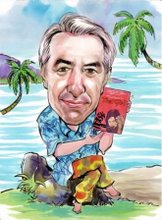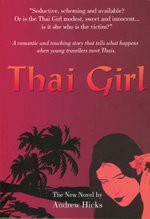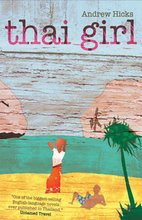



Cat’s term at the college supposedly finished last week but she went in over the week end and yesterday she had an exam in accounting. I’m not sure when it’s all over and I don’t think she knows exactly either.
Anyway, I’m chafing at the bit and need to get away. I’m forever at home slaving over my computer and dreaming of distant places, a trip down south to Koh Samui even.
I like Samui better than Phuket. It’s a real island set far out in an azure sea and much less urbanised. When I was last there six or seven years ago I took a motorbike into the hills and cruised the many back tracks through palm trees and forests. The views were spectacular, it was relatively fresh and cool and there were lots of unspoiled open spaces. Samui’s developing too but it’s big enough to absorb a lot of holiday makers without being overrun.
When back-packing I always just turned up somewhere and found the place I wanted to stay but now with so much info on-line, it’s fun doing a bit of advance research.
And I’ve just found an amazing website.
On www.samui-virtual.com there’s a map of the island overlaid with a series of icons each representing a resort, hotel, pub, temple or whatever. You click on the icon and a logo and brief description pops up. Click on this and you go straight into the website. It’s a brilliant way of finding and making contact with the accommodation and services exactly where you want them.
I’m a map sort of person anyway. I loved the ‘map histories’ my kids used at school… it’s impossible for example to understand ancient China without maps. And I once thought of doing a guidebook of Thailand based entirely on maps. It was a great idea, but of course a web based equivalent is even better as it’s never out of date. Now www.samui-virtual.com have now done exactly that for Samui.
Now I’m day dreaming of beaches and palm trees. Samui! Samui! So near and yet…! I fear my trip may have to remain virtual.
I still hope we’ll get away but maybe not that far. Cat’s pretty tired so I’ll have to be less ambitious.
Last night she’d planned a party at home for all her friends after the exam, the theme being farang food. She’d decide to do barbecued chicken and pasta in a very nice Italian sauce made by Nana Foods, a company based in Chainat run by a delightful American called Kirk who I met recently at the Thaivisa party at the Farang Connection in Surin.
The food was amazing but disaster soon struck. It seemed to be getting dark rather early and then distant thunder began in the direction of Sangkha. It was the first rain in several days but of course it meant the students were not going to brave the journey on their motorbikes. Even so, Cat’s English teacher and one of the computer teachers arrived in a nice new car. They were delightful company and we certainly had plenty to eat!
Then yesterday was the day I dread, visa day.
I have a yearly retirement visa for which you need to look old and produce a bank certificate that you’ve held 800,000 baht for at least three months in a Thai account. I’ve always previously done my renewal in Bangkok but the immigration offices there are dreadfully crowded and last year after a five hour wait my application was summarily turned down.
‘That’s a new requirement then?’ I said to them. ‘How can I ever know what the rules are going to be?’
‘You can’t,’ she said. ‘The rules change every day. The rules change again on Monday so come in again and I’ll give you the visa.’
I queued again on Monday and a different woman refused me my extension on different grounds.
This time my plan was therefore to try a local up-country immigration office and see if they were a bit less hassled. Yesterday, the strategy worked out. As it turned out the office was full of greying farang and things were very busy, but I got my visa. The two officers worked steadily through the papers and didn’t spring any rule changes on us this time.
The visa process is a fascinating system with two aims apparent… one is to generate work and employment and the other is to raise cash for the Thai government.
Yesterday my visa extension cost me 1,900 baht but there’s a catch. If I leave the country they’ll cancel it and I’ll have to apply again from outside. I thus have to buy a ‘multiple re-entry permit’ which costs an extra 3.800 baht. So that was quite an expensive day.
It’s not the end of the world for me, but I sometimes wonder that if the Thai government’s main objective is to attract foreigners retiring here, they’d maximize the benefit if they reduced the fees and made the process more transparent and easy.
It’s remarkable efficient in many ways though, given that it’s based on a bureaucratic style that clunks noisily in a labour intensive style that’s distinctly nineteenth century. In this remote village office, they were able to check into a computer and find my immigration details. They’ve got records of all my exits and entrances and my whole history of visa applications on line, plus mug shots of me taken at the airport and I find this most impressive. Yesterday they were asking us the names of our parents and keying them in and got us to sign a long document written in Thai. What it said I’ve no idea but I signed it anyway.
On the other hand, in a way that’s almost luddite, this modern system is backed up by hard copy that must generate vast mountains of paper. When I apply in Bangkok they disappear out the back and produce my file, inches thick and then add even more to it. Yesterday they painstakingly wanted copies of the relevant pages of my passport to support the visa application and another identical set for the re-entry visa.
Trouble was, they don’t have a photocopier and so twice poor Cat, who was there as my interpreter, had to trek off into town to get the copies. I thought I’d brought the right copies with me, but no, they’re never enough.
Their date processing is genuinely impressive, but then there’s the rubber stamps! For recording the visa on the passport and application forms, I counted about twenty five rubber stamps lying in an in-tray.
The re-entry permit for example needs about seven bits of info stamped into the passport and it takes time and care to find the right stamp (they have to pick each on up and look at the bottom of it) and to apply it to the precise spot without a mistake... all done with nervous and irrritable farang buzzing round them. Yesterday the aircon was on the blink but the two officers kept their cool. For us it’s torment. For them I suppose it’s just a job.
For me and Cat the bonus was that we then took off to the lake not so far away and sat in a grass roofed pavilion over the water and ate royally as the cool breeze fanned away the tensions.
Driving back home I could then actually enjoy the fresh green vistas of rice fields and rural Thailand at its most beautiful. It’s mid-rice season now and the rains have been heavy recently so all was lush and verdant as we cruised comfortably along enjoying the scenery.
Out there in the fields it’s tough though, especially the planting which is all but done. Now’s the time for managing water levels, for rooting out invading weeds and for hand casting fertilizer and sometimes insecticides, both very expensive indeed.
A business that produces cash flow once a year isn’t the easiest to manage at the best of times. Last year the price of rice went up after most small farmers had sold their crops. This year all inputs such as fuel, seed and fertilizer have rocketed and the prospect in the market is still uncertain. Who knows what price they’ll get.
I wish them the best but somehow it seems the small farmers always lose out.
So who am I to grumble about not making Samui a reality?
Copyright Andrew Hicks The Thai Girl blog.























